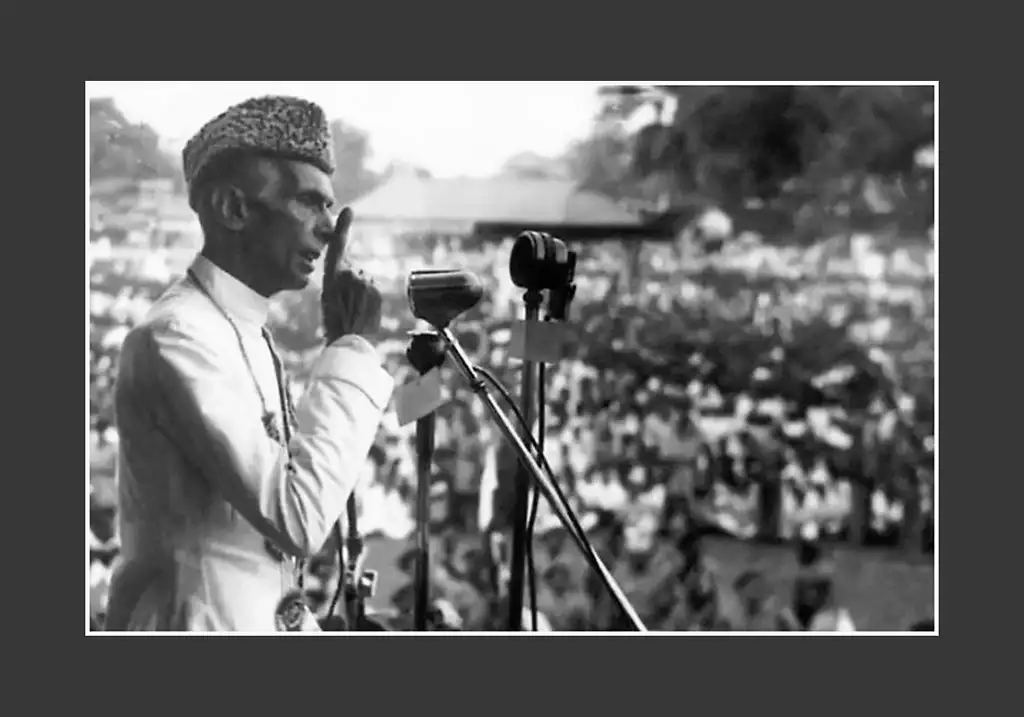Ahsa.pk has written Quaid-e-Azam Muhammad Ali Jinnah essay with quotations in up-to-date grammar that may help you to get the best marks in your English essay. This essay also covers My favourite Personality essay.
Quaid-e-Azam Muhammad Ali Jinnah Essay with Quotations
Pakistan is a peaceful place that came into being after the worthful struggles of Quaid-e-Azam Muhammad Ali Jinnah. The subcontinent India has great leaders but above all is Quaid-e-Azam. This principled and hardworking personality was born in Karachi on the 25th of December, 1876. His father Mr. Poonja Jinnah was a reputed businessman. His mother Mithibai was also an educated woman and belongs to Khoja Ismaili Shia Muslim of Gujarati background. Muhammad Ali was the first son of Mr. Jinnah.
Innovation distinguishes between a leader and a follower.
Steve Jobs, Apple co-founder
Mohammad Ali Jinnah received his early education at the Sindh Madrassat-ul-Islam and Karachi Grammar School. Poonja Jinnah gave his son a good education and at the age of sixteen, he was transferred to England for studying law by his father. He proved himself over there as a keen and honest pupil. He studied law at Lincoln’s Inn and did his Bar-at-Law from there in 1896. On his return to his motherland after a few years, he set up as a lawyer in Bombay. He soon came a successful lawyer. In 1900, he appointed justice for the Bombay Presidency.
During his stay in London, Quaid-e-Azam was deeply displeased by the English views about the people in the subcontinent and his interest in politics began to arouse. So, he left his practice of law and joined the Indian National Congress in 1906 and began struggling to unite the Hindus and the Muslims against the English. But he felt that the Hindu Leaders were trying to guard their own interests. After seven years, he decided to join the All-Indian Muslim League.
I do not believe in taking the right decision, I take a decision and make it right.
Muhammad Ali Jinnah
He worked for a separate kingdom for the Muslims. He presented fourteen points in March 1929 in which he demanded a homeland for the Muslims of India. These demands were rejected by Congress. But he didn’t lose heart. He was a man of strong will. He faced a large number of severities but he remained firm on his stage. In 1930, he became the beloved leader of all the Muslims of the Indian subcontinent. And in 1933, he started leading Muslim League. Gandhi, the leader of Indians called him an ‘impossible man’. The Muslim League passed a resolution in 1940 at Minar-e-Pakistan, demanding a separate motherland for the Muslims.
Quaid-e-Azam was a veritably great lecturer. He delivered great speeches at the time of his struggle for Pakistan. He mentioned all the important aspects of the separate place in his speeches. When he spoke in the Constituent Assembly, he debated its functions easily. After a long struggle, his sweats ended with success. After a long difficult period, the dream of Pakistan came to reality on the 14th of August 1947. The first governor-general of Pakistan was Quaid-e-Azam. He labored day and night for the development of the country.
He was a man of great head and heart and no doubt a great politician. He was valiant and bold having principles of passing life. This peace-loving personality always wanted to see Pakistan prosperous and significant. His message of unity, faith, and discipline is a motto for us to follow. His health failed due to hard work and circumstances that he died on the 11th of September, 1948. But his services to the Muslims of India will keep him alive in our hearts always. Now, we are thankful to Allah for this great leader.
With faith, discipline and selfless devotion to duty, there is nothing worthwhile that you cannot achieve
Muhammad Ali Jinnah
14 Points of Quaid-e-Azam Muhammad Ali Jinnah
These points are major accomplishments and Muhammad Ali Jinnah’s notable achievements that reflects now in the form of Pakistan. Quaid meaning in English is leader which truly guide the world Mohd Jinnah is a great leader.

- The form of the unborn constitution should be federal, with the residuary powers to be devolved in the provinces.
- A similar measure of autonomy shall be granted to all provinces.
- All legislatures in the country and other elected bodies shall be constituted on the definite principle of acceptable and effective representation of minorities in every province without reducing the majority in any province to a minority or indeed equivalency.
- In the Central Legislature, Muslim representation shall not be lower than one-third.
- Representation of collaborative groups shall continue to be by separate electorates handed that it shall be open to any community, at any time, to abandon its separate electorate in favor of the common electorate.
- Any territorial division that might at any time be necessary shall not in any way affect the Muslim majority in the Punjab, Bengal, and the NWFP.
- Full religious liberty i.e., liberty of belief, praise, observance, propaganda, association, and education, shall be guaranteed to all communities.
- No bill or resolution or any part thereof shall be passed in any legislature or any other elected body if three-fourths of the members of any community in that particular body oppose such a bill, resolution, or part thereof on the ground that it would be malicious to that community or in the replacement, similar to other system is applied as may be set up practicable to deal with similar cases.
- Sindh should be detached from the Bombay Presidency.
- Reforms should be introduced in the NWFP and Baluchistan on the same footing as in other provinces.
- Provision should be made in the Constitution giving Muslims an acceptable share along with the other Indians in all the services of the State and in local self-governing bodies, having due regard to the conditions of effectiveness.
- The Constitution should embody acceptable safeguards for the protection of Muslim culture and for the protection and creation of Muslim education, language, religion, and particular laws and Muslim charitable institutions and for their due share in the assistances in-aid given by the State and by local self-governing bodies.
- No cabinet, either Central or Provincial, should be formed without there being a proportion of at least one-third of Muslim ministers.
- No change shall be made in the Constitution by the Central Legislature except with the concurrence of the States constituting the Indian Federation.
We with dignity celebrate the Happy Birthday of our leader Muhammad Ali Jinnah on 25 December each year.




